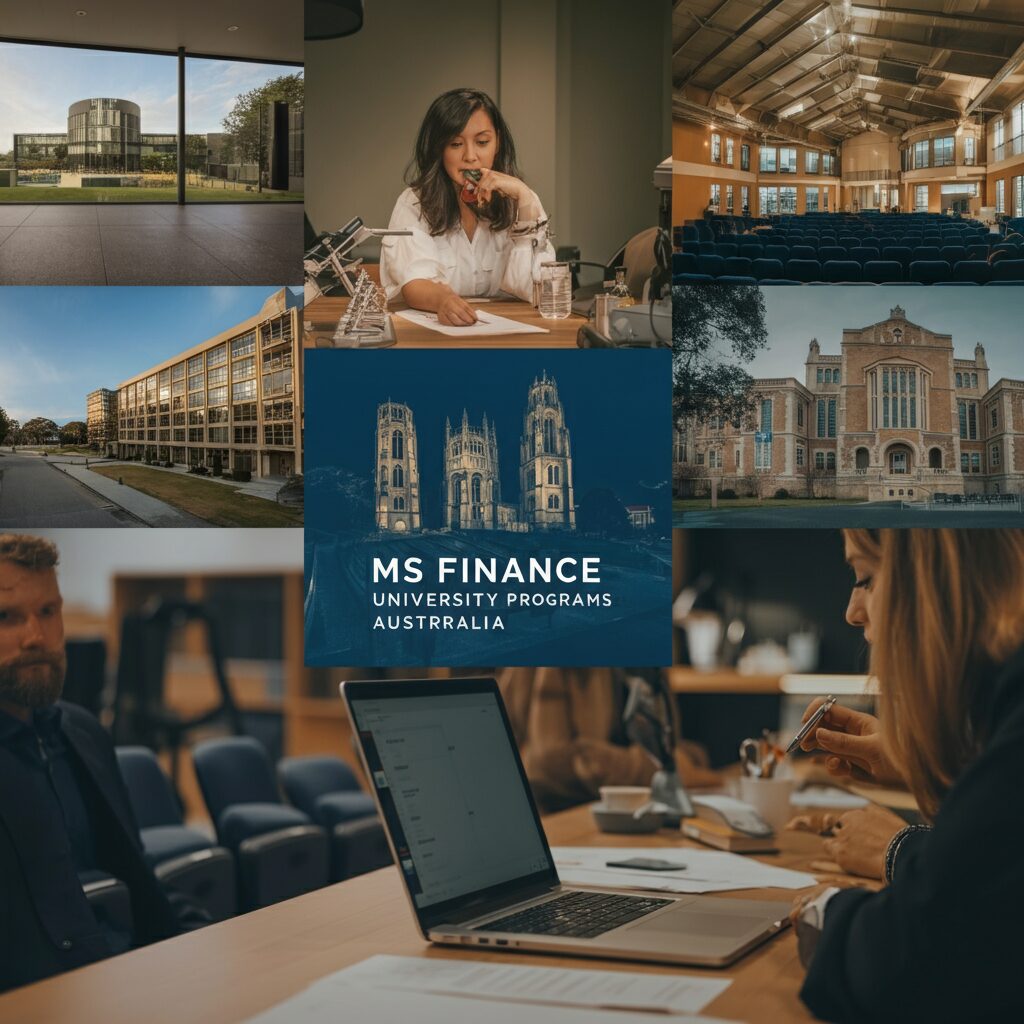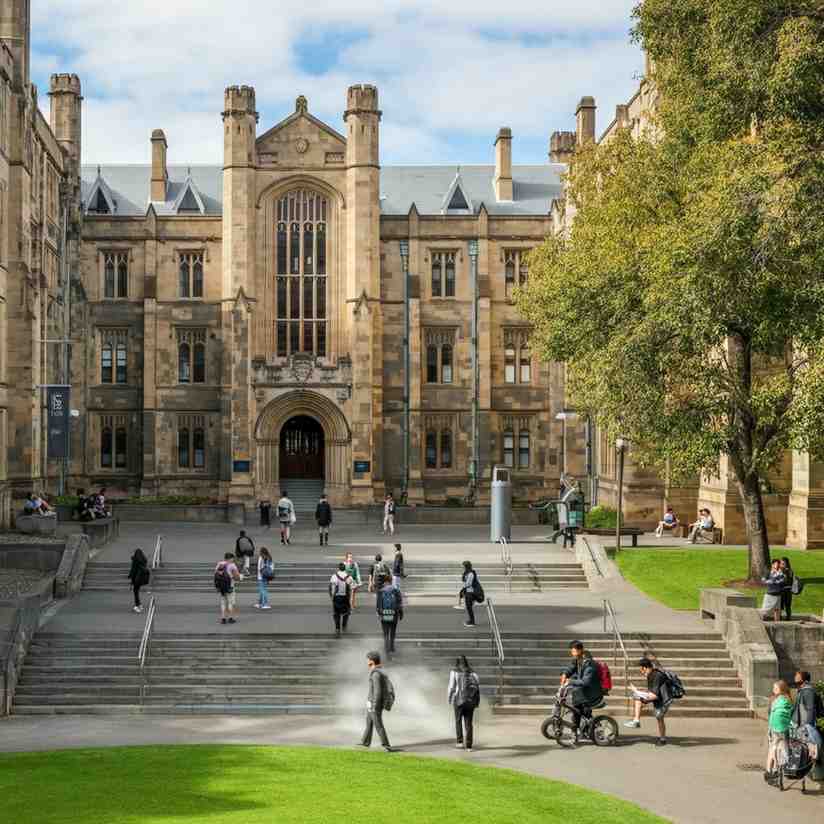Are you considering pursuing an MS Finance in Australia? You’re making an excellent choice. Australian universities lead the world in education standards, and students can achieve their finance career goals while studying in this country, which also offers perfect conditions for living.
Latest Facts and News:
- The Australian finance sector expects a yearly growth rate of 3.6% during the next decade, which will generate more positions for graduates with an MS Finance degree.
- Singapore Management University stands out as the top Australian educational institution for the Master of Finance based on the Financial Times Global Master’s in Finance ranking 2024.
- New fintech specialisations have been introduced in several Australian universities’ MS Finance programs, reflecting industry trends.
- Starting from 2025, the Australian government will expand its scholarship program for international students who enrol in finance-based degrees.
- Through its partnership with major financial institutions, the University of New South Wales, Sydney, ensures its MS Finance students receive special internship placements.
Dive into the world of high finance and discover how an MS Finance in Australia degree from Australia’s top universities can propel your career to new heights in the global financial landscape.
Top Universities for MS Finance in Australia 2025
When researching the best universities for MS in finance in Australia, several institutions consistently rank at the top for their exceptional programs, faculty expertise, and industry connections.
University of Melbourne
- Program: Master of Finance
- Duration: 18 months full-time
- Annual Tuition: AU$ 37,536
- Students can access multiple essential attributes, including a detailed academic program and domestic and international business collaboration, together with international academic recognition.
The finance program at the University of Melbourne stands as a prime academic institution in Australia because it delivers robust training in financial analytics and investment decision-making to students. Students receive both academic theories and real-world training through a curriculum that prepares them for financial leadership positions.
University of New South Wales (UNSW)
- Program: Master of Finance
- Duration: 1 year full-time
- Annual Tuition: AU$ 50,200
- This educational program features an industry-based curriculum while maintaining research-focused academic work and benefits from strong relationships between graduates and alumni.
The quantitative finance and risk assessment methodologies receive strong emphasis as an outstanding feature of UNSW’s program structure. Through its established ties with Sydney’s financial district, the university gives students essential access to valuable networking possibilities and financial industry knowledge.
Australian National University (ANU)
- Program: Master of Finance
- Duration: 2 years full-time
- Annual Tuition: AU$ 46,176
- Mr. McCloskey’s program includes detailed specialised studies accompanied by top-tier teaching staff and extensive research possibilities.
The finance program at ANU earns recognition because of its demanding approach to financial markets, combined with corporate finance. Students can spend two years developing comprehensive expertise in financial theory and specialised areas because of the extended timeframe.
Monash University
- The Master of Banking and Finance program exists as a two-year full-time educational path which costs AU$ 46,176 per year.
- Duration: 1.5 years full-time
- Annual Tuition: AU$ 48,100
- The program features practical skills training, international learning opportunities, and CFA Institute endorsement.
At Monash University, students receive a first-class education in portfolio management skills alongside banking operations instruction. A CFA Institute partnership enables the university to deliver a curriculum that satisfies worldwide industry requirements.
University of Queensland
- Program: Master of Financial Management
- Duration: 1.5 years full-time
- Annual Tuition: AU$ 45,120
- This program includes flexible organisation and both real-world placement and Bloomberg Terminal access as important features.
Students at the University of Queensland benefit from Bloomberg Terminal access as well as state-of-the-art facilities, which allow them to practice financial modelling and asset valuation.
| University | Program | Duration | Annual Tuition (AU$) | Key Specializations |
| University of Melbourne | Master of Finance | 18 months | $37,536 | Corporate Finance, Investment Management |
| UNSW | Master of Finance | 1 year | $50,200 | Quantitative Finance, Risk Management |
| ANU | Master of Finance | 2 years | $46,176 | Financial Markets, International Finance |
| Monash University | Master of Banking and Finance | 1.5 years | $48,100 | Banking, Portfolio Management |
| University of Queensland | Master of Financial Management | 1.5 years | $45,120 | Financial Analysis, Asset Valuation |
Curriculum and Specialisations in Australian MS Finance Programs
Australian universities deliver thorough finance courses through which they distribute both fundamental theories and useful practical knowledge to educate students about international financial market intricacies.
Core Areas of Study
- A study of corporate finance includes classes about capital structure, dividend policy, and corporate governance, which lead to qualifications for the field of financial management.
- The discipline educates students regarding professional fund manager techniques for performance evaluation alongside investment strategies and asset allocation procedures.
- Financial Risk Management courses teach students to recognise and measure financial hazards, together with their methods for risk control, which include market, credit, and operational risks.
- Quantitative Finance teaches students the combination of financial problem applications with computational methods, statistical analysis, and mathematical modelling abilities.
- These courses teach students about using derivatives and fixed-income securities to price and implement options, alongside futures and swaps, alongside fixed-income financial instruments.
Emerging Specializations
- The transformation of the finance industry through technology demands specialised fintech and blockchain-based programs at many institutions worldwide.
- These courses investigate ESG factors and sustainable finance elements as they relate to investment choices because more investors want to invest responsibly.
- Behavioural Finance explores psychological factors that affect how people make financial decisions and how they relate to market irregularities.
- Students discover how Artificial Intelligence, together with machine learning technologies, transform financial trading, risk evaluation, and produce future market predictions.
- The international financial management courses train students to become global financial professionals through their study of exchange rate risk, together with international capital market dynamics and overseas commerce operations.
Analysis and practice apply as core parts of Australia’s top university curricula, so students gain experience through case studies, simulations and industry-oriented projects.
Admission Requirements for MS Finance in Australia
Students seeking enrollment in top MS Finance programs at Australian institutions need to fulfil various academic qualifications along with language proficiency standards. Here’s what you need to know:
Academic Prerequisites
- Bachelor’s degree in finance, economics, or related field
- Minimum GPA requirements (typically 3.0 or equivalent)
- Relevant coursework in mathematics, statistics, and economics
Most of the best colleges in Australia for MS in finance require a strong undergraduate background in a quantitative discipline. Students who lack experience in finance can gain admission but need to take supplemental courses before starting their program.
English Language Proficiency
- IELTS: Overall score of 6.5-7.0 (no band less than 6.0)
- TOEFL iBT: 90-100 (with minimum section scores)
- PTE Academic: 65-70 (with minimum section scores)
As an international student, demonstrating English proficiency is essential for success in your MS Finance in Australia program.
Additional Requirements
- Statement of Purpose (SOP)
- Letters of Recommendation (2-3)
- Resume/CV
- Preferred work experience exists as a prerequisite, but its presence is not always mandatory.
| University | Minimum GPA | IELTS Requirement | Work Experience | Application Deadline |
| University of Melbourne | 65% or equivalent | 6.5 (6.0 min per band) | Not mandatory | Nov 30 (Feb intake), Apr 30 (Jul intake) |
| UNSW | 70% or equivalent | 6.5 (6.0 min per band) | Not mandatory | Nov 30 (Feb intake), May 31 (Jul intake) |
| ANU | 70% or equivalent | 6.5 (6.0 min per band) | Not mandatory | Oct 31 (Feb intake), Apr 30 (Jul intake) |
| Monash University | 65% or equivalent | 6.5 (6.0 min per band) | Not mandatory | Nov 15 (Feb intake), May 15 (Jul intake) |
| University of Queensland | 65% or equivalent | 6.5 (6.0 min per band) | Not mandatory | Nov 30 (Feb intake), May 31 (Jul intake) |
Career Prospects and Job Opportunities for MS Finance Graduates in Australia 2025
Graduates with an MS Finance in Australia qualification are well-positioned for rewarding careers in various sectors of the financial industry.
Popular Career Paths
- The investment banking sector provides opportunities in mergers and acquisitions, together with capital raising functions and corporate restructuring efforts.
- Research, valuation, and investment opportunity recommendations constitute positions in financial analysis.
- Corporate Finance – Careers in financial planning, treasury management, and strategic financial decision-making.
- Risk management functions concentrate on discovering financial hazards alongside assessment and prevention tasks.
- Asset Management exists to handle the portfolio management of both institutional and individual investments.
- Fintech and Blockchain Development – Emerging roles at the intersection of finance and technology.
Salary Expectations
- Entry-level positions: AU$65,000 – AU$85,000 per annum
- Mid-level positions: AU$90,000 – AU$120,000 per annum
- Senior positions: AU$130,000+ per annum
The financial services sector of Australia generates over 9% of the national GDP by employing more than 450,000 people. MS Finance graduates enjoy promising professional prospects since financial sector analysts expect it to grow at a yearly rate of 3.6% through 2025.
Also Read: Latest IELTS Score For Australia: Experts’ Updated Guide
Why Choose Australia for Your MS in Finance
Pursuing a finance education in Australia comes with many advantages that benefit international students.
Academic Excellence
- International academic institutions based in Australia maintain positions among the 100 most respected universities across the globe.
- Modern educational programs are developed through research, which maintains active knowledge of industry progress
- The programs focus on industry needs because they receive guidance from working finance experts.
The best universities for MS in finance in Australia are known for their rigorous academic standards and innovative teaching methods.
Global Recognition
- The educational credentials from Australian educational institutions earn worldwide recognition from employers.
- The educational institutions feature extended professional relationships between alumni who work in financial centres worldwide.
- Opportunities for global careers through university partnerships and exchange programs
An MS Finance in Australia qualification opens doors to career opportunities not just in Australia but across Asia-Pacific and beyond.
Quality of Life
- The university offers a secure multicultural environment which provides a friendly atmosphere to students from overseas.
- Excellent work-life balance with beautiful natural surroundings
- Recipients of post-study work visas receive permission to develop their careers through practical work experience in Australian industries.
Australia has proven to be one of the leading nations regarding quality of lif,e thus attracting large numbers of international students.
Comparison of Best Colleges in Australia for MS in Finance
When choosing where to pursue your MS Finance in Australia, it’s important to compare key aspects of different programs:
| University | Minimum GPA | IELTS Requirement | Work Experience | Application Deadline |
| University of Melbourne | 65% or equivalent | 6.5 (6.0 min per band) | Not mandatory | Nov 30 (Feb intake), Apr 30 (Jul intake) |
| UNSW | 70% or equivalent | 6.5 (6.0 min per band) | Not mandatory | Nov 30 (Feb intake), May 31 (Jul intake) |
| ANU | 70% or equivalent | 6.5 (6.0 min per band) | Not mandatory | Oct 31 (Feb intake), Apr 30 (Jul intake) |
| Monash University | 65% or equivalent | 6.5 (6.0 min per band) | Not mandatory | Nov 15 (Feb intake), May 15 (Jul intake) |
| University of Queensland | 65% or equivalent | 6.5 (6.0 min per band) | Not mandatory | Nov 30 (Feb intake), May 31 (Jul intake) |
Financial Aid and Scholarships for International Students
Financing your MS Finance in Australia is made easier through various scholarship opportunities:
University-Specific Scholarships
- Outstanding applicants who receive Melbourne Business School Scholarships gain awards that offer full coverage or up to 100 per cent of tuition expenses.
- UNSW Business School Excellence Scholarships – Competitive scholarships for high-achieving international students.
- The ANU College of Business and Economics Scholarships offer different awards that combine academic achievement with leadership abilities.
Government Scholarships
- The Australia Awards Scholarships provide complete funding to students who originate from developing nations worldwide.
- Endeavour Postgraduate Scholarship – Merit-based scholarships for international students.
External Scholarships
- The Rotary Peace Fellowship provides educational opportunities to students who aim to resolve conflicts through their dedication to peace initiatives.
- The Fulbright Scholarships grant prestigious opportunities to US students who wish to study abroad.
Scholarship applications need to be submitted early since most deadline dates occur 6 to 9 months before a program starts.
Student Life and Networking Opportunities in Australian Universities
The student experience is an important aspect of your MS Finance in Australia journey:
Student Organizations
- The Finance and Investment Clubs arrange both industry professional meetings and events and investment competitions throughout the year.
- Student associations based on international students assist members during their adaptation to Australian life.
- Professional Development Societies provide members with career readiness services through their programs of resume workshops and interview preparation sessions.
Industry Connections
- Banks and financial institutions invite experts to deliver lectures to students
- The educational institution partners with major banking institutions and financial services organisations for their internship programs.
- Student networking events, together with career fairs, facilitate employer engagement opportunities for students.
Students can generate job offers through professional connections, which network events make possible after completing their studies.
Also Read:
Recent Developments in Australian Finance Education 2025
Australian finance education remains active in development because it adapts to new professional requirements in the industry:
Curriculum Updates
- Finance education combines artificial intelligence and machine learning content in its programs since technological analysis plays an increasingly important role in financial processes.
- The curriculum now includes sustainable finance and ESG investing since students need to understand responsible investment methods.
- Educational institutions are placing greater value on data analytics and programming capabilities needed for contemporary financial positions.
Industry Partnerships
- The business units with fintech startups to give students first-hand access to new financial technological tools
- The program establishes research initiatives with financial companies to tackle genuine business issues.
- The funding from financial industries supports competitions run for students to address real-world challenges.
These developments ensure that MS Finance in Australia programs remain cutting-edge and relevant to industry needs.
Application Process and Timeline for MS Finance Programs in Australia
The process of applying demands students to observe both crucial dates and essential requirements.
Key Application Deadlines
Semester 1 (February intake): October-November of the previous year
Semester 2 (July intake): April-May of the same year
Application Steps
- First, research will be conducted to select universities by comparing their programs, reputations, and individual preferences.
- You must prepare all essential documentation, which includes academic records and English proficiency evidence, and individual statements
- You must send your applications to university websites through their online portals.
- Students should apply for scholarships during the same period when applying for admission to their program.
- Students who did not take English proficiency tests should secure their examination slots.
- Seek a student visa from the institution when you are accepted for enrollment.
Your application timeline for Australian education should begin 6-8 months before your planned enrollment date because this period lets you handle visa procedures and plan your relocation.
Conclusion
Pursuing an MS Finance in Australia offers a unique blend of world-class education, global exposure, and excellent career prospects. The financial sector of Australia makes it an exceptional location for aspiring finance professionals because it provides top academic institutions, industry-focused programs, and a strong economic market. Students who enrol in an Australian MS Finance program will obtain the education needed to thrive in global financial industries through the development of knowledge and practical skills and networking opportunities.
The best colleges in Australia for MS in finance offer programs that combine rigorous academic training with practical skills development, preparing graduates for the complexities of modern financial markets. The curriculum includes various elements of finance, which students need to succeed professionally through courses in financial analysis, risk assessment, portfolio management, and derivatives trading skills.
Your commitment to researching each program and career goal alignment must coincide with the use of Australian university resources to select your graduate studies in finance program. With careful planning and dedication, an MS Finance in Australia can be your stepping stone to a rewarding and successful career in the dynamic world of finance.
FAQs
Q1. The expense of studying MS Finance at Australian institutions is both lower and higher than that found in other nations.
Tuition fees in Australia are higher than in some European countries, although they offer more reasonable costs compared to similar US and UK programs. The nation provides decent educational standards along with job opportunities, which enable international students to discover effective learning paths.
Q2. International students studying MS Finance in Australia can find part-time job opportunities through the student visa regulations.?
International students possessing a valid student visa may work a maximum of 40 hours each fortnight while enrolled in classes and perform full-time work during the academic year’s scheduled breaks. Student employment options exist directly on many universities ‘ campuses.
Q3. Which Australian MS Finance programs offer internship or practical training periods to their students?
MS Finance curricula at Australian universities come with internship elements and industry projects linked to practical field experience. The programs allow students to develop practical experience combined with important networking contacts in their field of study.











It’s great to see Australian universities adapting their finance programs to include fintech – it really shows how they’re keeping up with industry demands. Curious if this shift also influences internship opportunities during the course?